| Introduction |
|
Welcome to the March edition of the Podcaster. I have been living in Arusha for the past five months on sabbatical leave from my position at Wageningen University, based at the IITA office in Tengeru. It’s been a great opportunity to spend some time with Dr Freddy Baijukya, the Tanzania N2Africa Coordinator and his team. We had a great field visit in January to the West Usambara mountains around Lushoto and joined a number of field days with local partners and farmers evaluating some of the field demonstrations on beans.
Photo: Farmers evaluating N2Africa technologies in Lushoto, West Usambara, northern Tanzania
|
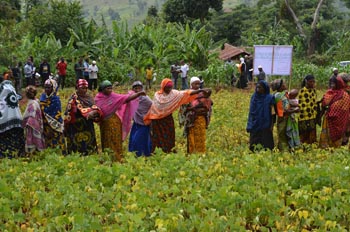 |
|
1 |
| N2Africa Partnerships |
|
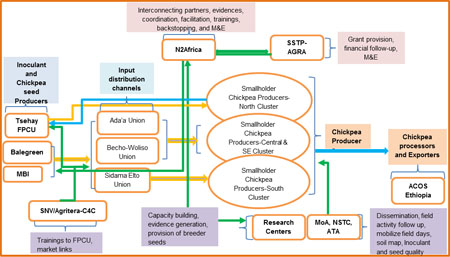
|
Moving on from a "proof of concept" during the first phase of the N2Africa approach at scale, the second phase was designed to scale out the proven legume technologies using a "business led" approach. ...
Figure: Flow chart of inputs, services and grain product between different chickpea value chain actors belonging to the partnership ship case with Balegreen in Ethiopia, as highligted in the textbox
|
|
2 |
| N2Africa-Ethiopia held its 2015 Annual Planning & the Public-Private Partnership (PPP) Validation Workshop |
|
N2Africa-Ethiopia held its second annual planning and the Public-Private Partnership Validation workshop on 21-23, January 2015 with about 90 participants from the NARS, private partners, ILRI, CG centers, representatives of farmers’ organizations and N2Africa leadership staff from Nairobi, Ibadan and Wageningen.
Figure 2. Partial view of ILRI-N2Africa Annual Planning & the Public-Private Partnership (PPP) Validation Workshop participants
|
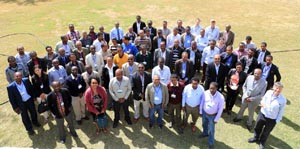
|
|
3 |
| 2015 Annual planning workshop of N2Africa, Ghana |
|
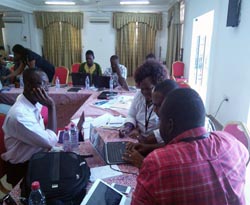
|
The 2015 annual project planning workshop took place from 3-5 February, 2015 at the Modern City Hotel, Tamale. Samuel Adjei-Nsiah (country coordinator) welcomed the participants and gave an overview of N2Africa project in Ghana. He also pointed out the objectives of the workshop and invited the partners to share their expectations.
Partner groups developing their action plans for 2015 season
|
|
4 |
| Theory of change and planning workshop held for Uganda Partners |
|
A national planning workshop for the N2Africa project in Uganda was conducted from 27th to 30th January 2015 at Kabira Country Club in Kampala. The purpose of the workshop was twofold; to build a common understanding of the vision of the N2Africa project and the logic underpinning of the project action, and to develop a national work plan for the second year. ...
Group photo of workshop participants - Prof. Johnny Mugisha, seated 2nd from right
|
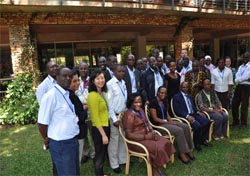
|
|
5 |
| MSc research in Kapchorwa district Uganda |
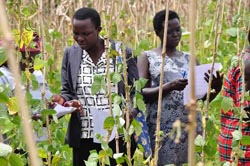 |
Who is that white man with his walking stick and that little guy?" farmers started asking other farmers. I climbed many hills (I tried to do this as well with a bunch of banana on my head: nearly impossible), sloped down slippery hills on rubber boots and did this all together with my soil probe and my (female) translator. It was an unforgettable rich experience and I want to thank the project and the Ugandan farmers and people for that! ... |
|
6 |
| N2Africa-Ethiopia Conducted Gender Training Workshop with the aim of Mainstreaming Gender into Legume Value Chain |
|
N2Africa Ethiopia national team in collaboration with Project Gender Specialist and the Centre for African Family Studies (CAFS), conducted gender training workshop during 15-18 December, 2014 at ILRI Addis Campus. The trainees were drawn from agronomy, soil sciences, plant breeding and socioeconomics and research extension departments of the NARS partners. The training was conducted to sensitize partners, mainstream approaches, and design work plans to address gender inequity in legume value chains and decision-making and hence to address one of the key project objectives "Empowering Women to Increase Benefits from Legume Production".
|
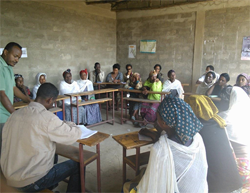 |
|
7 |
| Co-design of improved climbing bean technologies in Uganda and Tanzania |
|
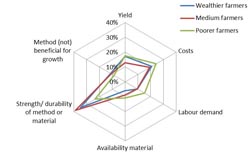
|
The 2015A rainy season is rapidly approaching in Uganda and northern Tanzania. For my PhD research on climbing beans in the highlands of these two countries, we have organized a number of discussions ...
Figure: Reasons that poorer, medium and wealthier farmers gave for preference of one staking method over the other (% is number of times a reason was mentioned divided by the total number of reasons). Staking methods compared were single stakes, tripods, sisal strings and banana fibre ropes.
|
|
8 |
| Certificate granted to N2Africa for its roles and partnership in “research and development” |
|
In Ethiopia, N2Africa project activities are implemented in 27 Woredas (Districts) over four regions (Amhara, Benishangul-Gumuz, Oromia and Southern region) in partnership with national, international and private institutions and NGOs, thus promoting N2-fixation and legume production technologies among smallholder farmers. ...
Figure: Certificate issued to N2Africa in recognition of its roles and contribution in promoting N2fixation and legume production technology in the Bale Zone of Oromia region, Ethiopia (the certificate reads in Oromiffa and Amharic languages).
|
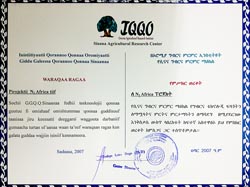 |
|
9 |
| N2Africa won an award as outstanding nutrition-sensitive scaling agriculture project! |
|
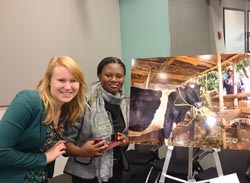
|
In 2012, The World Bank Group launched the SecureNutrition Platform to bridge knowledge gaps between agriculture, food security and nutrition. Together with Global Alliance for Improved Nutrition (GAIN) and Save the children UK, the SecureNutrition Knowledge Platform’s 2013 Harvesting Nutrition contest was initiated to showcase projects that link agriculture, food security and nutrition and their challenges. ...
Photo: Ilse de Jager and Theresa Ampadu-Boakye showing the award won by N2Africa
|
|
10 |
| Ethiopian case study of adoption domains for N2africa published in the Atlas of African Agriculture Research and Development |
| We have just published a case study of the adoption domains for N2Africa using chickpeas in Ethiopia as an example. Our maps and analysis show how we have combined three different factors - population density, access to chickpea markets, and agro-ecological zone - that affect the adoption of chickpeas in Ethiopia.
Our submission to the atlas has four maps as well as explanations of what these are maps telling us, why this is important and information about the underlying data.
You can view our submission here.
|
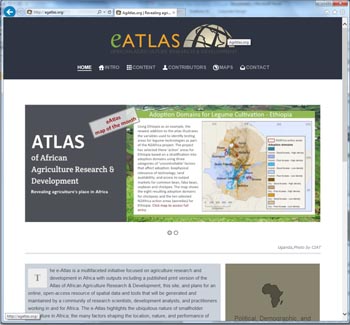 |
|
12 |
| Cowpea-maize relay cropping. A method for sustainable agricultural intensification in northern Ghana? |
Wytze Marinus did his MSc thesis research in Karaga district, part of the Northern Region and in Kassena Nankana district, Upper East Region, food insecure districts where considerable population growth rates will lead to increased demand for food production and higher pressure on agricultural lands. A clear need exists for sustainably increasing crop yields in this area where maize is the most important cereal and one of the most important staple crops. He focussed on cowpea in the cowpea-maize relay cropping.
|
13 |
| It’s all about beans... Rwanda even released a song |
Rwanda’s top musicians King James, Miss Jojo, Riderman,Tom Close, and Urban Boyz have donated their talent for a healthier Rwanda and promote beans as you can see in this clip from HarvestPlus.
(Published before on Facebook on 22 January 2015)
|
14 |
| IITA news on N2Africa activities in Tanzania |
Catherine Njuguna (IITA) kindly shared with us a blog on the IITA website on very recent N2Africa activities in Tanzania.
In addition to publication via this blog a slightly different version of the article was published on page 3 of last weeks IITA weekly bulletin.
|
15 |
| Report Borno Youths training |
In Podcaster 28 on page 8 we informed you on the training of youths from Borno State Nigeria on Agrobusiness.
We now also received their report which is attached here
|
16 |
| 2016 PanAfrican & World Cowpea Conference |
First announcement
On behalf of N2Africa Ken Giller accepted the invitation for N2Africa to cohost the joint PanAfrican Grain Legume and World Cowpea Conference, to celebrate the 2016 International Year of Pulses, as declared by the United Nations (http://www.iyop.net/). The conference is organized by Legume Innovation Lab, Michigan State University and IITA.
|
17 |












